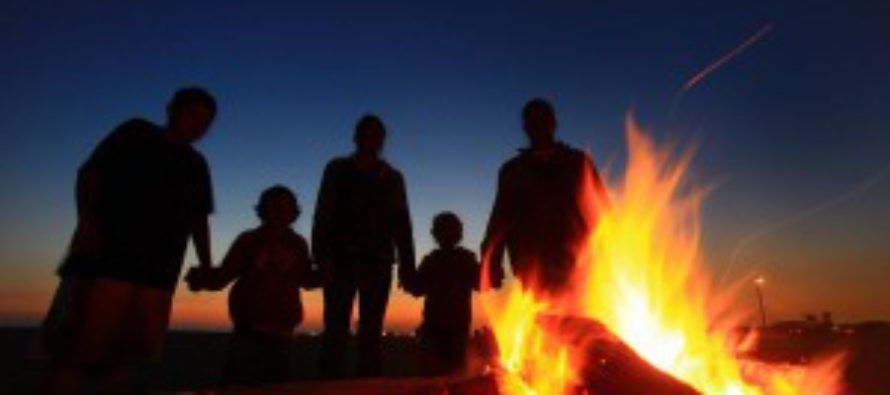Bill to save beach bonfires passes Assembly

For many state residents, roasting marshmallows over a beach fire ring is as Californian as surfing and the Beach Boys. Yet in recent years the rings have come under fire for producing smoke and noise.
The California Assembly voted unanimously Monday to keep control of the fire rings with local cities. The vote countered restrictions on the fire rings imposed last year by the Southern California Air Quality Management District, as well as a potential total ban.
The Press-Telegram reported last July:
“DIAMOND BAR – Despite vocal opposition from some beachgoers, the South Coast Air Quality Management District board Friday approved restrictions on fire pits on Southland beaches.
“The restrictions require fire pits to either be kept at least 700 feet away from the nearest residence. The rings can be closer than 700 feet to residences if the rings are at least 100 feet apart from each other — or at least 50 feet apart if a city has 15 or fewer rings. The measure also includes restrictions on beach fires on high-pollution days.”
A bipartisan effort led to Assembly Bill 1102, co-authored by two Orange County assembly members, Travis Allen, R-Huntington Beach, and Sharon-Quirk-Silva, D-Fullerton. If the bill becomes law, before a city is forced by the AQMD to remove the fire rings from the beaches in Orange and Los Angeles counties, the AQMD would be required to work with local coastal cities and oversight agencies to:
- Prove there will be no loss of beach access;
- Prove there will be no harm to local economies under any AQMD regulations;
- Address environmental concerns.
2013 resolution
Last year, Allen authored ACR 52, which read:
“This resolution supports the protection of California’s beaches, access to those beaches, and important traditions that are integral to our culture and beach lifestyle, such as fire rings….
“Beach bonfires are a safe and inexpensive recreational activity and are enjoyed by all the members of our community, regardless of socioeconomic class.… Beach attractions result in optimum economic and community activity, from gatherings of family and friends, beach barbeques, community events, and beach sports, and much more.”
After the non-binding resolution passed, it was evident the AQMD was not going to reverse the bonfire bans. So Allen and Quirk-Silva announced AB1102, legislation to officially reverse the AQMD’s actions.
“The fire rings have been an important part of our beach experience for over 60 years,” the group Save the Southern California Beach Bonfire Rings explains on its website and Facebook page. “They provide an affordable means of gathering family and friends on Southern California shores to celebrate our outdoor beach lifestyle with s’mores and hotdog roasting under the stars, all while enjoying the glow of a warm fire.”
Allen pointed out that banning the fire rings would cut $1 million a year in fees for Huntington Beach and $19 million for all Orange County coastal cities.
Health concerns
The push to ban fire rings originated in Newport Beach from residents who live near the beach and don’t like the smoke wafting into their homes. According to the Daily Pilot:
“Under the rule, Newport Beach, whose application to the California Coastal Commission to remove its fire rings first spurred the AQMD to look into a possible ban, can get rid of its 60 fire pits near the Balboa Pier and at Corona del Mar State Beach.”
Allen also told CalWatchdog.com that those who live along the ocean in many coastal cities don’t like the beach crowds and have complained to local officials about the noise from nighttime bonfires.
Even though the homeowners bought the property knowing it was attached to publicly accessed beaches, residents demanded government regulators ban the fire pits to keep people off the beaches at night.
However, homeowners complaining about people using the beach near their homes would not elicit much sympathy.
Stronger reasons for removing the rings came after the American Lung Association claimed the fire pits are a health hazard.
“Fire rings are creating hazards in communities that are damaging to one’s health and to the health of residents who live nearby,” said Bonnie Holmes-Gen, senior director for policy and advocacy for the American Lung Association in California. “We’re very concerned about the impact of the smoke, … and it contributes to asthma attacks, strokes, a number of respiratory illnesses, and it can even cause premature death.”
Holmes-Gen said particulates in wood smoke are especially dangerous to young, developing lungs. Holmes-Gen said teenagers and young adults, the very people supposedly at the greatest risk from beach fires, are the most frequent attendees at the fire pits.
Yet the bill analysis says, “[T]he greatest health effect from wood smoke exposure originates from the fine particles that can cause health problems ranging from minor irritations such as burning eyes and runny noses to chronic illnesses such as bronchitis.”
Bill proponents also point out beach wind speed is usually high, cleaning the air.
Regulating wholesome, inexpensive fun
“Beach bonfires are an activity enjoyed by people from all across California, including those who cannot afford multi-million dollar beachfront homes,” Allen said in the Assembly Monday. “This legislation will ensure that every Californian has access to our beautiful beaches through the affordable iconic activity of a beach bonfire.”
“This is just another family fun activity,” said Quirk-Silva. “We wanted it handled at the local level, but that is not to be.”
“This is a symbol of a free people,” Assemblyman Tim Donnelly, R-Hesperia, added. “It should’t be regulated to a privileged few.”
Assemblyman Eric Linder, R-Corona, talked of fond family memories of a sunset on the beach, a bonfire, and roasting marshmallows.
“It would be hard to imagine the Orange County Coast without fire rings on the beach,” Allen said. “Now let’s go burn some wood.”
Related Articles
Game wardens seek to duck furloughs
Feb. 11, 2010 By ELISE VIEBECK Witnesses at a recent Assembly hearing voiced concerns that game wardens, unlike conventional law
Legislating Fur
It’s difficult not to chuckle at Assemblywoman Fiona Ma’s, D-San Francisco, proposed bill requiring all garments sold in California made
Gerawan workers protest UFW as court date looms
A fresh twist has arisen in the drama surrounding Gerawan Farms’ dispute with United Farm Workers. The long-running controversy, which pitted




